JACKIE BROWN
NOT JUST A THEATRE ORGANIST
-oOo-
RADIO DAYS
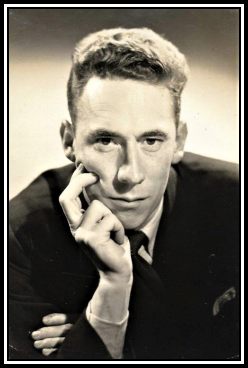 Jackie Brown
Jackie Brown
-oOo-
In addition to composing, arranging and helping to make recordings as a Session Musician, Jackie also was recording programmes for Radio Luxembourg and the BBC. Although the history of much of his Radio work work remains somewhat sketchy, with the help of Jackie’s daughters, Amanda and Julie, we have been able to gain some knowledge of it, which forms the material found on this page.
-oOo-
The BBC (British Broadcasting Company) Radio Services began in 1922 and offered a range of programming, which it hoped would appeal to the general public. However, the BBC was slow to appreciate the growing popularity of modern trends causing a segment of society to look elsewhere for their radio entertainment. This need was first filled by commercial Radio Stations based in Europe, of which the English language sector of Radio Luxembourg was one of the first when founded in 1933. With the advent of Rock ‘n’ Roll, Pirate Radio Stations transmitting from offshore ships and disused sea forts began to appear and became widespread in the early 1960s. The popularity of such stations resulted in the BBC revising the format of certain of its Radio Stations and the launching of Radio One on the 30th September, 1967, which is its station geared specifically for those wishing to listen to Pop Music.
Financing of programmes presented by the English language sector of Radio Luxembourg came from either Companies wishing to advertise their products, entrepreneurs wanting to interest the public in their ventures, or later, by Music Companies hoping to increase sales of their latest recordings. Pirate Radio Stations obtained their finance by advertising a variety of products.
In1970, Parliament passed a Bill to allow the licensing of Commercial Radio Stations in the U.K. In 1973, The London Broadcasting Company (LBC) broadcast news and features twenty-four hours a day and was the U.K.’s first station to be funded predominantly by advertising.
With the success of Radio One and other services available to listeners, the audience of the English language sector of Radio Luxembourg dwindled, which eventually led to the Satellite and Shortwave Service closing down at midnight of the 30th December, 1992. The 208-Medium Wave Service continued, but as RTL Radio–Der Oldiesender, which is a German Oldies Radio Station.
-oOo-


Programmes were either presented live by Disc Jockeys or Resident Announcers from the Station’s Studios in Luxembourg or recorded at its Studios at 38 Hertford Street, London W1 and transmitted at a later time.
 38 Hertford Street, London W1
38 Hertford Street, London W1
It is probable that Jackie’s association with Radio Luxembourg, for the most part, was recorded at the London studios. However, it is known that he was part of a recording made for the Station from the Prison Camp at Bergen-Belsem. Unfortunately, I have not been able to learn all of the programmes that Jackie was a part of, but I am certain that he was involved in the making of the post-war version of The Ovaltineys Concert Party, sponsored by the milk drink Ovaltine, and Take Your Pick.
-oOo-


Ovaltine, originally named Ovalmaltine, is a brand of milk flavoring product made with Malt extract, sugar and Whey and was first produced in Switzerland and was first exported to the U.K. in 1909. Ovaltine is a registered trademark of Associated British Foods and is made by Wander AG, a subsidiary of Twinings. It is most often marketed as a sleep-aid.
Ovaltine was advertised on Radio Luxembourg, by means of The Ovaltiney’s Concert Party transmitted by the Station’s Long Wave Transmitter. The programme was presented on Sunday evenings between 5.30 and 6,00 p.m. from 1934 until 1939 until the station ceased operation due to the outbreak of war.
The programme featured British Music Hall comedian Harry Hemsley (1877–1951) who through a series of sketches and songs impersonated four children, Johnny, Elsie, Winnie and Baby Horace. Listeners were able to become members of The Ovaltineys Club and received The League of Ovaltineys Rule Book and the League of Ovaltineys Badge and were then able to take part in competitions and other activities.
 The Official League of Ovaltineys Rule Book & Badge
The Official League of Ovaltineys Rule Book & Badge
At the peak of the programme’s popularity in 1939, membership rose to five million, and in 1936, a Comic was produced featuring the characters from the Concert Party.
The programme was introduced by The League Song ……. We are the Ovaltiney’s Little Boys and Girls.

The Club Song
In 1952, a new version of The Ovaltiney’s Concert Party was aired at 6.15 p.m. on Sunday evenings over Radio Luxembourg’s new 208 Medium Wave Transmitter. Unfortunately, the programme was only on the air for a couple of years.
It was during the reincarnation of The Ovaltiney’s Concert Party that Jackie took part.
-oOo-
For a more detailed history of The Ovaltiney’s, click HERE.
-oOo-

During Jackie’s professional career, he helped provide the music for two successful Game Shows: one for Radio and the second for Television.
The first Game Show for which Jackie provided organ background music was Take Your Pick. The show was produced for Radio Luxembourg and began broadcasting in 1952 and continued until 1955 when the programme moved to Television. Jackie did not follow when it made this move and his place at the organ was taken by Harold Smart (1921-1980) who was the son of Theatre Organist Charles Smart (1897-19??).
-oOo-
The programme was hosted both on Radio and Television by its creator, Michael Miles (1919-1971) and was the first British Game Show to offer money as a prize.
 Michael Miles
Michael Miles
Take Your Pick was divided into two parts: firstly, contestants were required to survive the Yes-No segment where they were asked a series of questions during one minute period and had to give answers without saying Yes or No. Should they fail, the sound of a gong was heard and the contestant left the show.

Take Your Pick – The Yes-No Segment; Jackie is heard at the start of the recording
Secondly, the survivors of the Yes-No segment were then each asked four questions. If they gave three correct answers, they a small amount of money and were next invited to pick a key to a numbered box.
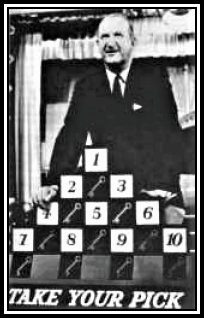 Mr. Miles with the numbered boxes
Mr. Miles with the numbered boxes
Following this, Mr. Miles would try to buy the key from the contestant with the offer of money. Should the contestant refuse to sell, they were finally invited to open the box with their key where they would either find a prize of some value (such as a holiday, a home appliance or the Star Prize etc) or one of the three Booby Prizes of no real monetary value. Hence the contestant took their pick!
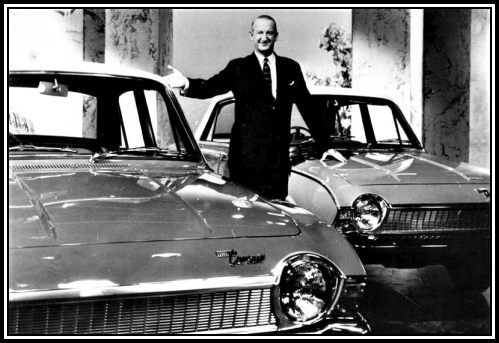 Mr. Miles with some of the featured prizes
Mr. Miles with some of the featured prizes
The audience was encouraged to participate by calling out suggestions as to what each contestant should or should not do (i.e. TAKE THE MONEY! ……. OPEN THE BOX!) and also to offer encouragement by yelling, cheering and clapping. Meanwhile, Jackie would be playing suitable notes on the organ to help mount the tension!
-oOo-

During Jackie’s association with Radio Luxembourg, he came in contact with a number of other musicians, singers, actors and many behind the scenes personnel. One such singer was Ronnie Hilton (1926-2001) who enjoyed great popularity in the U.K. during the 1950s and 1960s and who had a weekly show on Radio Luxembourg for several years.
 From Left to Right: the music director Will Fyffe Jnr. (1927-2008), Ronnie Hilton,
From Left to Right: the music director Will Fyffe Jnr. (1927-2008), Ronnie Hilton,
actor John Blyth (1921-1993) & Jackie at Radio Luxembourg
Ronnie Hilton – No Other Love
-oOo-

Jackie appeared on BBC Radio both before and after his return from Canada. He performed on both the Home Service (1939-1967) and the Light Programme(1945-1967) on numerous occasions with a variety of orchestras and bands. In addition he also with a small group of musicians, forming The Jackie Brown Trio and The Jackie Brown Quartet. He also made a number of programmes playing the Theatre Organ installed in some of London’s cinemas.
-oOo-
One of Jackie’s earliest appearances was in 1949, which was broadcast on the Light Programme. The programme was entitled Panamania and featured several Latin American-style groups of musicians including Jose Norman & His Orquestra Pan-Americana and was introduced by Edmundo Ros (1910-2011). Mr. Ros was also a band leader and enjoyed great success playing Latin American-style music.
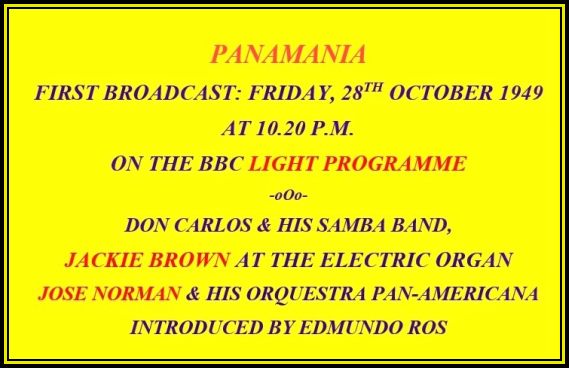
-oOo-
Jose Norman (1906-1990) was born in Liverpool and was trained as a classical pianist. He developed an interest in Cuban Music and enjoyed great success with the various incarnations of his Orchestra and was responsible for introducing the Rumba to the U.K. and Europe.

Jose Norman & His Rumberos playing Cubana
Mr. Norman’s wife was a daughter of the Cuban Consul General in Liverpool and It is from her family that he heard Cuban Music and took to it. His wife’s family had a large coffee plantation in Cuba, and he decided that he and his family would move there. One of his children, Manuel, got into trouble with the dictatorship before Fidel Castro (1926-2016) came to power and he had to return to England where he became a University Lecturer.
Unfortunately Mr. Norman and his wife lost the plantation to the authorities of the new Communist regime, and they and the remainder of his family became constantly harassed, and eventually had to leave Cuba and arrived in the U.S. as refugees. Mr. Norman died in 1990.
-oOo-

Jackie made a number of broadcasts for early morning music programmes for both the Home Service and the Light Programme during the 1950s. These included Bright and Early on the Home Service and Morning Music which was transmitted on both Services.
Making such broadcasts allowed Jackie to work with a number of Orchestras including the BBC Revue Orchestra (1964-1979) under the direction of Harry Rabinowitz (1916-2001) who was its director from 1953 until 1960. In addition, Jackie was able to perform with a small group of musicians, thereby forming The Jackie Brown Trio and The Jackie Brown Quartet.
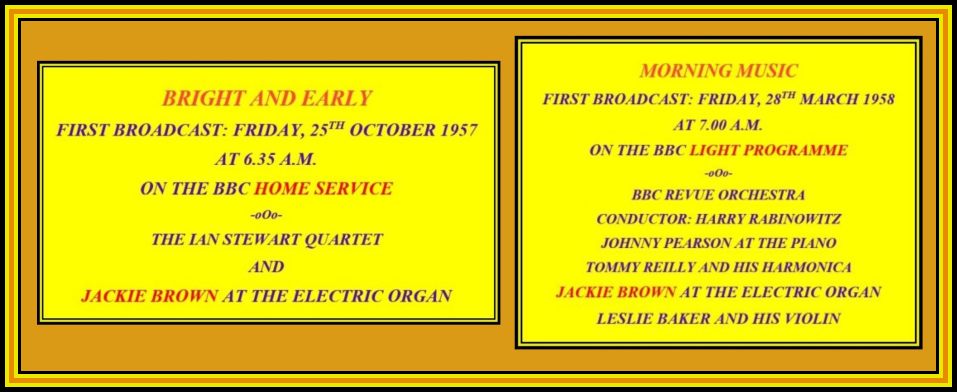

Jackie also played on the mid-day Home Service broadcast, Break for Music and also appeared on a number of Light Programme broadcasts including Join in and Sing and Sing it Again.

-oOo-
I am sure that there are some other BBC Radio programmes where Jackie appeared, but unfortunately, I have not been able to find any details about them.
 Jackie Brown with Johnny Marrison & His Music
Jackie Brown with Johnny Marrison & His Music
-oOo-
At one time, the BBC Radio presented thirty-minute programmes featuring the Theatre Organ with a number of prominent organists playing those installed in London cinemas.
Mr. Keith Beckingham informs me that by the mid-1960’s virtually all Theatre Organ broadcasts were recorded. He also remembers the BBC producer, Charles Clark-Maxwell telling him that it had been decided that Jackie’s performance of the 4th April in 1968, which was to be his first and only solo programme from the Granada Theatre Tooting, should be a live broadcast and before an audience, thereby making it a unique experience for that time.
 Jackie at the Console of The Wurlitzer Theatre Organ of The Granada Theatre Tooting
Jackie at the Console of The Wurlitzer Theatre Organ of The Granada Theatre Tooting
during a concert organised by The Cinema Organ Society on 31st January, 1957
The Concert given by Jackie at the Theatre Organ of The Granada Theatre Tooting
that was recorded on the 4th April, 1968 and which was repeated on
the BBC Radio’s The Organist Entertains
-oOo-
The Organist Entertains was a programme that was broadcast on BBC Radio 2 (one of the two radio stations formed in 1967 when the BBC Light Programme was reorganised) from 1969 to 2018. The thirty-minute programme showcased a number of Theatre, Pipe and Electronic Organs played by a variety of Organists with Jackie being featured periodically,

-oOo-
In November 1954, Mr. Clem Bernard died, the arranger/conductor/pianist on the BBC Radio programme, Billy Cotton Radio Show and Jackie was invited to take his place. This allowed Jackie to work on the show both in its Radio, and later, in its Television incarnation. To learn more about these years, continue reading the next page.
—oooOooo—
ACKNOWLEDGEMENTS
I would like to thank Mr. Andrew Gilbert, Mr. Michael Wooldridge, Mr. Keith Beckingham and Mr. Manuel Norman (son of Jose Norman) for their help in the writing of this page.
